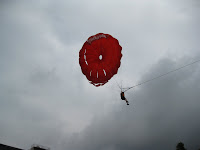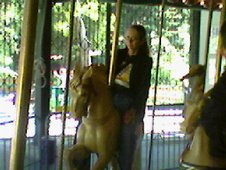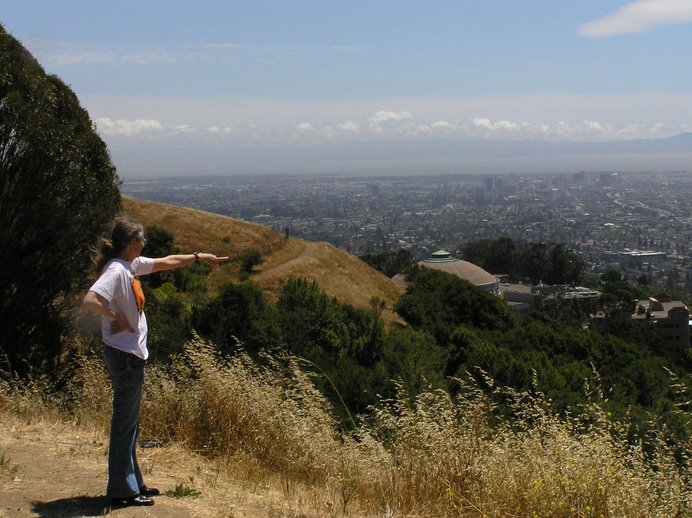











Perhaps some of you may have noticed that I am an idealist. While most Americans appear to be devoting their lives to plotting how they can buy the most stuff at the mall on their credit cards, I devote most of my free time to plotting about how we can save the world.
"No one can save the world," said my friend Rick. "Mankind's nature is intrinsically violent and self-serving. As much as you would like it to be otherwise, the world is just not going to get saved." Ha! I'm sorry but I just can't accept the idea that human beings will never get bored of napalming babies for profit. Sooner or later, surely our "good" genes will kick in.
"Yeah, right. Just like you always swear that you are not going to eat any more ice cream -- but then you do." Oops. Busted.
"But I'm thinking that if I was only wiser or smarter or kinder," I replied, "maybe I COULD save the world. For 66 years now, I've been struggling with how to make my brain work better so that I can make the world a better place. You are an expert on hallucinogenic drugs. Which ones could I take that might help me see more clearly what else I can do to save the world?"
Back in the 1960s I took mescaline, a derivative of peyote, while up on a hilltop in Big Sur. And what I realized then is that nothing we can do or own is of any importance if it doesn't get us directly in touch with nature -- the earth, the plants, the stars, water and even the dirt under our feet. Everything else is just useless set-decoration. But then, after having been blessed with that terribly illuminating insight, I immediately popped into my car, drove back down to Carmel and ate a huge stack of pancakes at IHOP.
Back in the 1960s, I took pharmaceutical-grade (and still legal) LSD right off the boat from Sandoz in Switzerland. And what I learned from that experience is that the most important thing in the world is creativity and art. Why are our children not getting art instruction and music lessons in their schools yet the Pentagon is getting trillions of dollars to murder folks with? How arse-backward is that?
Then Rick began to give me a tour of his nursery. "Tell me what that plant is -- and what does it do?" I asked him, pointing to a nearby vine.
"That's ayahuasca, a hallucinogen from Brazil. It is used for medicinal and spiritual purposes by the tribal shamans of the Amazon basin."
"If I chewed on one of its leaves, would I have hallucinations?"
"No, it's the bark that is effective. Plus you need to drink it in combination with the leaves of the chalipanga plant, that one over there."
"And what is this plant here like?" I asked, pointing to my left.
"That's iboga, from central Africa. Its alkaloid root bark is used during tribal initiation rites for young men and is a very strong hallucinogen. The tribal elders claim that it turns their young boys into men -- if they survive the ceremony. It also is used as a treatment for alcohol abuse both here in Mexico and back in the States."
"What does that one over in the corner do?"
"That's a Chinese herb that has medicinal uses similar to Ginseng. It's supposed to give you long life. And the one next to it is Guarana, used in American energy drinks. It's a stimulant."
"And the tree-like one?"
"That's called Brugmansia. Tree datura. It was made famous by the 1960s hippie icon Carlos Castanada in his Don Juan books. But it's a very serious drug. Too much of it will kill you. I took it once, and I kept having to tell my heart to keep beating. I couldn't breathe."
"Did it give you hallucinations?"
"On that drug, Jane, I WAS the hallucination!"
"And what about this plant over here?"
"That's called Kratom. It does many things. It's both a stimulant and a relaxant, which is sometimes a good combination."
Rick obviously loved his plants and knew a lot about them -- he recently gave a talk on hallucinogenic plants at the PV botanical gardens -- but he was also worried that I might not be seeing them at their best. "It may not feel like it to you, but right now it is winter down here in Puerto Vallarta -- so most of these plants aren't in bloom and have very few leaves. But if you come back in two months, there will be much more to see."
"And what would happen if I ate a leaf off of that plant over there?"
"Probably not much. You have to ingest at least three or four of those leaves. That's Khat. It's from Somalia and Yemen. It's another stimulant." Rick also had several coffee plants. Nope, no appeal for me there. I have enough trouble sleeping already.
There was a scrawny little cactus plant in a pot on a table. "What's that?"
"That's agave." But obviously the poor little thing was struggling so hard just to stay alive that eating it was not an option, even for me.
So. Did I find any plants in Rick's nursery that might enable me to get enlightened enough to gain enough knowledge to be able to save the world? No. But I had a fairly nice morning rambling around in the sunshine and enjoying nature. Plus it was a hecka lot better than hitting the PV malls with the other American tourists.
"Hey, Mom!" interrupted my daughter Ashley from the other side of the garden. "Wanna go para-sailing today? Where you fly up over the beach in a parachute?" Hell no. I don't want my Doors of Perception opened that badly.
PS: Ashley finally convinced me to go para-sailing and I was so completely terrified that I entered, stepped through and even went WAY beyond the Doors of Perception -- to say nothing of almost pissing my pants. Going beyond terror, however, had a surprisingly relaxing effect -- especially when there was a mother whale and her calf swimming around in the ocean a half-mile below me. But when I safely touched down on the beach again and Bonano, Charley and Juan caught me securely, I gotta admit that I passed out cold from relief.
"Let's do that again!"
****
To read more about Rick's "ethno-botanical" nursery, go to his website at http://www.xplanta.com/?page_id=15. And here's the website for the Vallarta Botanical Gardens: http://www.vallartabotanicalgardensac.org/
"No one can save the world," said my friend Rick. "Mankind's nature is intrinsically violent and self-serving. As much as you would like it to be otherwise, the world is just not going to get saved." Ha! I'm sorry but I just can't accept the idea that human beings will never get bored of napalming babies for profit. Sooner or later, surely our "good" genes will kick in.
"Yeah, right. Just like you always swear that you are not going to eat any more ice cream -- but then you do." Oops. Busted.
"But I'm thinking that if I was only wiser or smarter or kinder," I replied, "maybe I COULD save the world. For 66 years now, I've been struggling with how to make my brain work better so that I can make the world a better place. You are an expert on hallucinogenic drugs. Which ones could I take that might help me see more clearly what else I can do to save the world?"
Back in the 1960s I took mescaline, a derivative of peyote, while up on a hilltop in Big Sur. And what I realized then is that nothing we can do or own is of any importance if it doesn't get us directly in touch with nature -- the earth, the plants, the stars, water and even the dirt under our feet. Everything else is just useless set-decoration. But then, after having been blessed with that terribly illuminating insight, I immediately popped into my car, drove back down to Carmel and ate a huge stack of pancakes at IHOP.
Back in the 1960s, I took pharmaceutical-grade (and still legal) LSD right off the boat from Sandoz in Switzerland. And what I learned from that experience is that the most important thing in the world is creativity and art. Why are our children not getting art instruction and music lessons in their schools yet the Pentagon is getting trillions of dollars to murder folks with? How arse-backward is that?
Then Rick began to give me a tour of his nursery. "Tell me what that plant is -- and what does it do?" I asked him, pointing to a nearby vine.
"That's ayahuasca, a hallucinogen from Brazil. It is used for medicinal and spiritual purposes by the tribal shamans of the Amazon basin."
"If I chewed on one of its leaves, would I have hallucinations?"
"No, it's the bark that is effective. Plus you need to drink it in combination with the leaves of the chalipanga plant, that one over there."
"And what is this plant here like?" I asked, pointing to my left.
"That's iboga, from central Africa. Its alkaloid root bark is used during tribal initiation rites for young men and is a very strong hallucinogen. The tribal elders claim that it turns their young boys into men -- if they survive the ceremony. It also is used as a treatment for alcohol abuse both here in Mexico and back in the States."
"What does that one over in the corner do?"
"That's a Chinese herb that has medicinal uses similar to Ginseng. It's supposed to give you long life. And the one next to it is Guarana, used in American energy drinks. It's a stimulant."
"And the tree-like one?"
"That's called Brugmansia. Tree datura. It was made famous by the 1960s hippie icon Carlos Castanada in his Don Juan books. But it's a very serious drug. Too much of it will kill you. I took it once, and I kept having to tell my heart to keep beating. I couldn't breathe."
"Did it give you hallucinations?"
"On that drug, Jane, I WAS the hallucination!"
"And what about this plant over here?"
"That's called Kratom. It does many things. It's both a stimulant and a relaxant, which is sometimes a good combination."
Rick obviously loved his plants and knew a lot about them -- he recently gave a talk on hallucinogenic plants at the PV botanical gardens -- but he was also worried that I might not be seeing them at their best. "It may not feel like it to you, but right now it is winter down here in Puerto Vallarta -- so most of these plants aren't in bloom and have very few leaves. But if you come back in two months, there will be much more to see."
"And what would happen if I ate a leaf off of that plant over there?"
"Probably not much. You have to ingest at least three or four of those leaves. That's Khat. It's from Somalia and Yemen. It's another stimulant." Rick also had several coffee plants. Nope, no appeal for me there. I have enough trouble sleeping already.
There was a scrawny little cactus plant in a pot on a table. "What's that?"
"That's agave." But obviously the poor little thing was struggling so hard just to stay alive that eating it was not an option, even for me.
So. Did I find any plants in Rick's nursery that might enable me to get enlightened enough to gain enough knowledge to be able to save the world? No. But I had a fairly nice morning rambling around in the sunshine and enjoying nature. Plus it was a hecka lot better than hitting the PV malls with the other American tourists.
"Hey, Mom!" interrupted my daughter Ashley from the other side of the garden. "Wanna go para-sailing today? Where you fly up over the beach in a parachute?" Hell no. I don't want my Doors of Perception opened that badly.
PS: Ashley finally convinced me to go para-sailing and I was so completely terrified that I entered, stepped through and even went WAY beyond the Doors of Perception -- to say nothing of almost pissing my pants. Going beyond terror, however, had a surprisingly relaxing effect -- especially when there was a mother whale and her calf swimming around in the ocean a half-mile below me. But when I safely touched down on the beach again and Bonano, Charley and Juan caught me securely, I gotta admit that I passed out cold from relief.
"Let's do that again!"
****
To read more about Rick's "ethno-botanical" nursery, go to his website at http://www.xplanta.com/?page_id=15. And here's the website for the Vallarta Botanical Gardens: http://www.vallartabotanicalgardensac.org/


